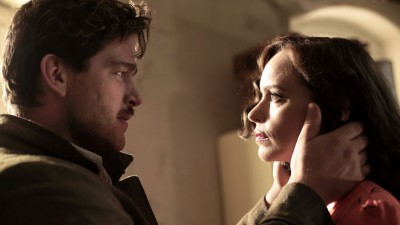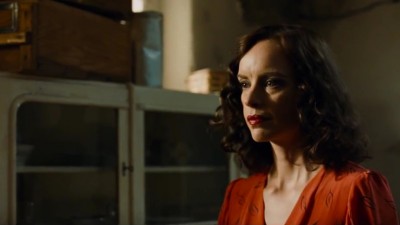| Reviews & Columns |
|
Reviews DVD TV on DVD Blu-ray 4K UHD International DVDs In Theaters Reviews by Studio Video Games Features Collector Series DVDs Easter Egg Database Interviews DVD Talk Radio Feature Articles Columns Anime Talk DVD Savant Horror DVDs The M.O.D. Squad Art House HD Talk Silent DVD
|
DVD Talk Forum |
|
|
| Resources |
|
DVD Price Search Customer Service #'s RCE Info Links |
|
Columns
|
|
|
Phoenix
The Movie:
How does one move on and have a normal life after living through one of the worst genocides in human history? How can you trust another human being again after seeing the absolute worst in people, and even dream of reclaiming old feelings of loyalty, safety, and love in someone who might have been responsible for destroying your life? That's the incredibly hard position Nelly Lenz (Nina Hoss) finds herself in after not only surviving Auschwitz with a disfigured face, but finding out that her husband Johnny (Ronald Zehrfeld) might have been the one who put him there.

Christian Petzold's intimate and haunting drama Phoenix isn't about the Holocaust per se, but about the many different ways, none of them easy, people struggled to reclaim their humanity after it was taken away from them. As Nelly suffers through facial reconstruction surgery, her friend Lene (Nina Kunzendorf) coldly informs her that pretty much everyone she's ever known and loved are either dead, or were Nazi informants.
Lene's tactless approach might make her seem uncompassionate, but her way of dealing with the horrors of the past is to forget about all of it and focus entirely on the future. That's why she insists on finding new life in Palestine, soon to become the state of Israel, and she wants to take Nelly with her. Nelly, on the other hand, wants to make peace with her past. That's why, even though she's told by Lene that Johnny informed the Nazis about Nelly's hiding spot, she wants to find out if Johnny still loves her. Since Johnny can't recognize Nelly's post-surgery face, he wants to use her to "pretend" to be Nelly so he can get his hands on Nelly's inheritance.
At first, it appears as if Nelly's going along with the plan to find out if Johnny really did betray her, but gradually her innermost motivation reveals itself to be a desperate attempt at feeling the intimate connection she had with Johnny before everything turned to a living hell. On the surface, it's easy to judge Nelly as a weak character, but how many of us would be able to face and accept even the possibility of such a betrayal from someone we loved so much? So Nelly goes along with the plan to look and act like "the real Nelly", while trying to pick up clues in Johnny's sullen face, cold and beaten by the harshness of life and perhaps intense guilt, that has any remnant of the love she was sure he felt for her. All of this builds to one of the most touching final scenes of the last couple of years.
A Hollywood prestige drama would have milked the mystery elements of the story instead of focusing on the humanity of it. The screenplay probably would have been told through Johnny's point-of-view, so that the "fake Nelly's" true identity would have been used as a twist ending, for pure shock value. The point of the second act would have been to play with the truth behind whether or not Johnny betrayed Nelly. But Petzold knows that unraveling the mystery isn't the point here. It's about whether or not the past will swallow Nelly whole, or if she has a chance of moving on from it. That's why the final scene, although seemingly providing easy pathos, is actually the most haunting one in the film.

The Blu-ray:
Video:
The gorgeous cinematography of Phoenix, courtesy of DP Hans Fromm, uses a lot of stark contrast within both light and color in order to make post-war Berlin look like a living nightmare. Behind the rubbles of the wall is nothing but empty darkness, which makes the 1080p transfer's black levels that much more impressive. The way the Phoenix nightclub, where Nelly first sees Johnny, shines in blinding crimson in the middle of the gray city, like a beacon of hope for Nelly, could have easily suffered from color bleeding. But hey, this is Criterion we're talking about. None of the video noise that we can expect from a film with such harsh cinematography pops up.
Audio:
Phoenix is a very intimate drama, with lots of quiet scenes full of hushed dialogue. That's where the DTS-HD 5.1 track really works in providing the essential ambiance such a film truly needs. The dialogue is clear, and the subtle sound mix is transferred impeccably. It's a bit annoying that a closed caption subtitle option isn't offered, since the English subtitles understandably don't appear during English-speaking parts.
Extras:
Christian Petzold and Nina Hoss: Petzold and Hoss has been working together consistently since 2001. This 25-minute interview goes deep into their professional and personal relationship.
Hans Fromm: The film's DP talks about his vision for the film, how he captured it, as well as the limitations and advantages of shooting on digital cameras.
Making of: This is a low-key 20-minute making of documentary, mostly consisting of the cast and crew talking about the way they approached the story and the characters.
We also get a Trailer and a leaflet with an essay by film critic Michael Koresky.
Final Thoughts:
Petzold not milking the mystery elements in a premise that seems to be tailor made for a Hitchcockian thriller might be frustrating for some audiences. Information that could be used as clever plot twists are all pretty much laid out from the beginning, revealing the audience the mystery behind Johnny's betrayal fairly early on, and a curious decision by a character to withhold a crucial piece of information doesn't make much sense. However, the film isn't about uncovering the surface truth, but whether or not it will even matter to someone who saw so much pain, and deserves to feel a small fraction of the love that once guided her life.
Oktay Ege Kozak is a film critic and screenwriter based in Portland, Oregon. He also writes for The Playlist, The Oregon Herald, and Beyazperde.com
|
| Popular Reviews |
| Sponsored Links |
|
|
| Sponsored Links |
|
|
| Release List | Reviews | Shop | Newsletter | Forum | DVD Giveaways | Blu-Ray | Advertise |
|
Copyright 2024 DVDTalk.com All Rights Reserved. Legal Info, Privacy Policy, Terms of Use,
Manage Preferences,
Your Privacy Choices | |||||||













